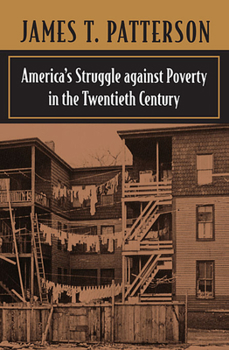America's Struggle Against Poverty in the Twentieth Century
Select Format
Select Condition 
Book Overview
This new edition of Patterson's widely used book carries the story of battles over poverty and social welfare through what the author calls the "amazing 1990s," those years of extraordinary performance of the economy. He explores a range of issues arising from the economic phenomenon--increasing inequality and demands for use of an improved poverty definition. He focuses the story on the impact of the highly controversial welfare reform of 1996, passed...
Format:Paperback
Language:English
ISBN:0674004345
ISBN13:9780674004344
Release Date:September 2000
Publisher:Harvard University Press
Length:334 Pages
Weight:1.07 lbs.
Dimensions:0.7" x 6.1" x 9.2"
Related Subjects
Americas Business & Investing Economic Conditions Economics Government History Modern (16th-21st Centuries) Political Economy Political Science Politics & Government Politics & Social Sciences Public Affairs Public Affairs & Administration Public Affairs & Policy Public Policy Social Policy Social Science Social Sciences Social Services & Welfare SociologyCustomer Reviews
1 rating
The Coexistence of Wealth and Poverty
Published by Thriftbooks.com User , 24 years ago
Throughout the 20th century, by practically every standard of measurement, the United States was the wealthiest nation in the world. Nevertheless, there always have been poor. This complex study by James Patterson, Professor of History at Brown University, seeks to explain the coexistence of wealth and poverty people in American society during the last century. In the process, Patterson makes a number of incisive observations about the nature of poverty. In the preface to the current edition, written in 1994, Patterson provocatively asserts his "continuing belief that poverty in the United States is not only a major concern - [is] perhaps the biggest the nation faces." This book is not easy reading, but it is essential for anyone seeking to understand an important issue in American politics at the beginning of the 21st century.Patterson's explication of competing theoretical approaches to the problem of poverty is excellent. In speaking about the 1940s and 1950s, Patterson identifies three "overlapping insights," although it is clear that these schools of thought evolved and recurred over the course of the century. The cultural anthropological perspective asserted that "class and poverty were cultural instead of economic" and that the behavior of poor people "is usually a perfectly realistic, adaptive, and - in slum life - socially acceptable response to reality." The liberal view originally expected the "economic revival of 1940-42 [to] solve the problem of destitution, [but] they insisted that welfare must remain an important element in public policy." The structuralists, according to Patterson, also "assumed the long-term need for extensive need for extensive public welfare" but also sought "major initiatives to counter low wages and underemployment." In the middle of the book, Patterson makes the astute, invaluable point that "policy formation rarely follows from a single intellectual perspective," and the implication is that legislated poverty programs often have drawn from two or more of these perspectives. Patterson writes: The economic growth between 1900 and 1929 prompted great optimism among social scientists." According to Patterson: "Some reformers, reflecting the optimism of the age, rejoiced that `public welfare' was replacing" older philosophies. During the crisis of the Great Depression in the1930s, some social workers feared the creation of a "permanent relief class," and President Roosevelt stated that he meant to get the federal government to "quit this business of relief." Although the "early welfare state" offered "categorical assistance for the needy over sixty-five, blind people, and dependent children," Patterson writes that a "distaste for welfare" persisted. When general prosperity returned during the 1940s, according to Patterson, it was "mainly the result of heavy government spending during World War II." That led to renewed optimism about ending poverty through economic growth, alone, and it was not un






